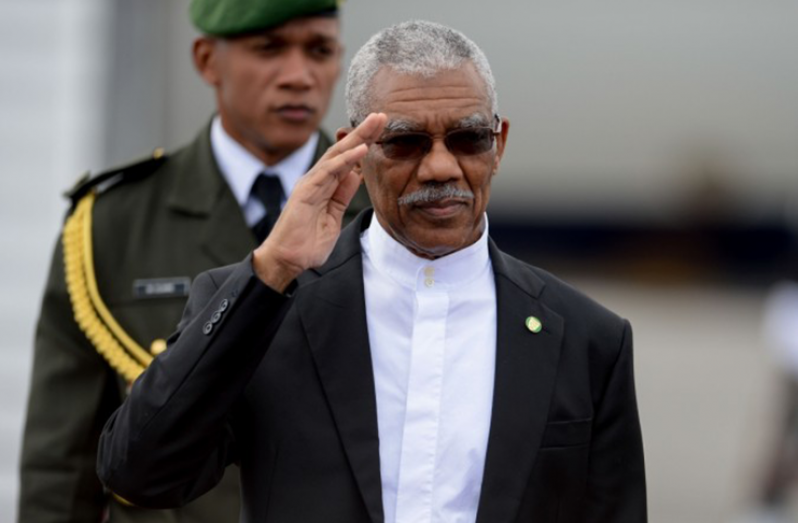…as country fails to defend claims that court lacks jurisdiction to hear border case
…President confident of Guyana getting a favourable judgement in a very short time
By Lisa Hamilton
VENEZUELA has still not informed the International Court of Justice (ICJ) on whether or not it will be putting forward oral arguments on the court’s jurisdiction to adjudicate the matter with regards to the case filed by Guyana – Arbitral Award of 1899 (Guyana v Venezuela).
Guyana’s Foreign Secretary, Carl Greenidge told this newspaper on Thursday that this information would have been placed on the ICJ’s website had it taken place, but when he last checked, there was no such change. He reiterated that Guyana is not waiting on Venezuela to move forward with the matter and its lawyers on the case are preparing themselves for the court proceedings ahead.
The oral hearings will be held in The Hague from March 23-27, 2020. The hearing will determine whether the court has jurisdiction over the case filed by Guyana on March 29, 2018. By that case, Guyana seeks to obtain, from the court, a final and binding judgement that the 1899 Arbitral Award, which established the location of the land boundary between then British Guiana and Venezuela, remains valid and binding, and that Guyana’s Essequibo region belongs to Guyana, and not Venezuela.
Contending that the ICJ lacks jurisdiction to adjudicate in the matter, Venezuela has failed to submit its Counter-Memorial on Jurisdiction – in response to Guyana’s Memorial on April 18, 2019 – a date which was fixed by the court. Nonetheless, the Spanish-speaking country was given the opportunity to contribute to the process and a deadline to do so by November 28, 2019. The Foreign Secretary has said that if Venezuela indicates to the ICJ that it will not submit oral arguments, the case will go on unhindered. “Whether or not Venezuela participates, I wouldn’t put it as being immaterial, but it does not frustrate the work of the court. The work of the court will proceed, whether or not they participate,” Greenidge said in November.

President David Granger, too, is looking forward to the ICJ’s final ruling on the matter as he said on Thursday, as a guest on Hits and Jams 94.1 BOOM FM, that the country remains very confident that the right judgement will be given. “We hope that we will get a judgement and we are very confident of getting a favourable judgement in a very short time. This has been a ‘monkey on our backs’ for half a century,” he said.
Guyana was keen on pointing out that for efforts over more than half-a-century, including a four-year Mixed Commission (1966-1970), a 12-year moratorium (1970-1982), a seven-year process of consultations on a means of settlement (1983-1990), and a 27-year Good Offices Process under the UN Secretary-General’s authority (1990-2017), all have failed to end the controversy.
After an international panel issued the 1899 Arbitral Award, Venezuela and Britain demarcated British Guiana’s border with Venezuela. Though both Venezuela and Britain had accepted the Arbitral Award in 1899, Venezuela, some 63 years later, rejected the award. On February 17, 1966, the Geneva Agreement was signed by the Government of the United Kingdom of Great Britain and Northern Ireland and the Government of Venezuela, thereby establishing a Mixed Commission with the task of seeking satisfactory solutions for settlement of the border controversy. Guyana gained independence in May 1966 with Essequibo an integral part of the state.
In September 2015, President David Granger called upon the then UN Secretary-General, Ban Ki moon, to have Venezuela’s contention that the Arbitral Award of 1899 is “null and void” settled with finality by judicial process, as per the Geneva Agreement. There have been several incidents involving military force, coercion and bullying by the Spanish-speaking country against Guyana.
Military Force and the threat of force included Ankoko Island, the Cuyuni occupation (1966); the sponsored Rupununi uprising of 1969; the Leoni Decree – the attempt to seize territorial sea (1968); assault on Eteringbang outpost 1970 & innumerable subsequent military acts; the military seizure of Technics Perdana — seismic survey vessel of Anadarko in 2013; and most recently, the attempted boarding of seismic vessel, Ramform Tethys on December 22, 2018.




.png)









